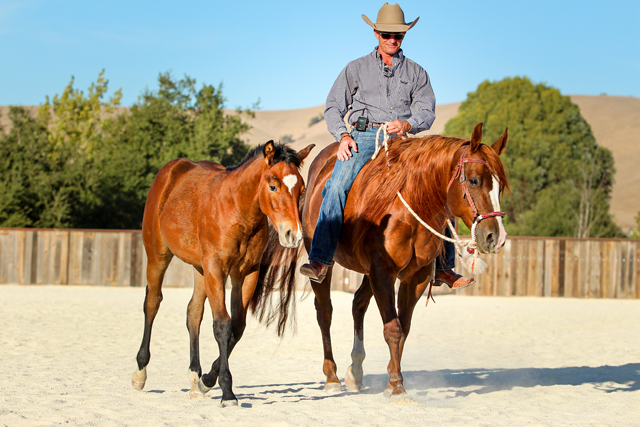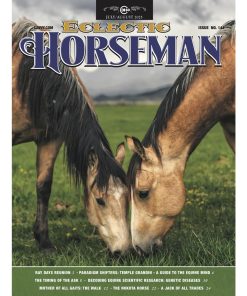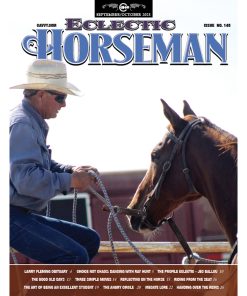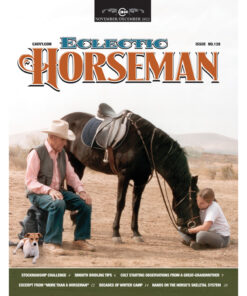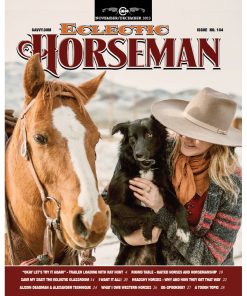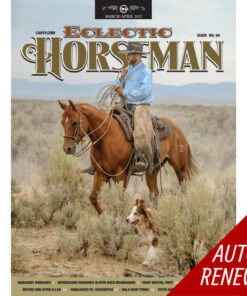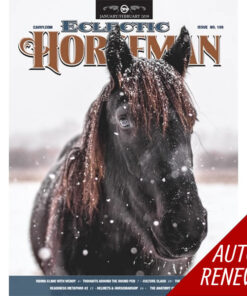This article appeared in issue No.137 of Eclectic Horseman Magazine – Order a print copy or order a PDF copy.
Paradigm shift: noun
A fundamental change in approach or underlying assumptionsA paradigm shift in horsemanship began in the American West in the mid-Twentieth century when Bill and Tom Dorrance began showing an effective, gentle way of horse training that emphasized feel and observations of horse behavior over the use of domination. Ray Hunt, Buck Brannaman, and Pat Parelli are notable figures who pushed that message out into the world, teaching humans and their relieved equines what became known as “natural horsemanship.”
Today, who are the teachers continuing this arc of what we can call “horse-humanship”? Who are the thinkers encouraging us to see and train and relate to horses from a grounded, scientific, and more humble platform of curiosity and wisdom?
This Eclectic Horseman series interviews just a few of the notable people—from trainers to body workers to veterinarians—who are putting the pieces together a little differently, and teaching us how to be better for our equines.
Warwick Schiller – Attuned Horsemanship
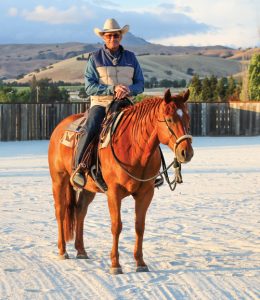 On a California day when the Paso Robles hills glow an astound- ing green and a red-tailed hawk traces overhead loops, a horse- man looks out intently from under a ball cap that reads “Journey On.” and says: “I’m trying to help people with their horses, and I’m coming at it from a perspective that is not necessarily normal in the horse world. It’s a relationship perspective, because as a trainer I now believe that relationship is everything.”
On a California day when the Paso Robles hills glow an astound- ing green and a red-tailed hawk traces overhead loops, a horse- man looks out intently from under a ball cap that reads “Journey On.” and says: “I’m trying to help people with their horses, and I’m coming at it from a perspective that is not necessarily normal in the horse world. It’s a relationship perspective, because as a trainer I now believe that relationship is everything.”
Warwick Schiller could be described as the great “dot-connector” working in the horse world today. He gathers seemingly- disparate pieces to affect change in horse-humanship: a remark- able willingness to share his journey as a trainer and human via his Journey On podcast, Journey On Summit gatherings, and Warwick Schiller Attuned Horsemanship video subscription site; his experience of decades as a working professional trainer; his ability to articulate clear principles around the training of horses; and a restless and ongoing curiosity about how other people are navigating their own life journeys—all of which work together to make him a central figure in the ongoing movement to improve human relationships with equines.
Performance Horsemanship
Born in Australia, Warwick moved to the United States in 1995 and became a full-time reining-horse trainer. He was the National Reining Horse Association (NRHA) Reserve World Champion in 2002, and has shown horses and coached riders to Champion and Reserve Champion placings at major reining horse shows, including the NRHA Futurity, NRHA Derby, National Reining Breeder’s Classic, and All American Quarter Horse Congress. He and his wife Robyn Schiller represented Australia at the 2010 and 2018 World Equestrian Games.
Gifted with a particular ability to articulate the often- elusive “whys” of horse training, Warwick created a popular YouTube channel in 2011 that now has 138,000 subscribers and boasts over 27 million views. His personal subscription site offers videos, courses, checklists, and community for horse owners who are, as he says again and again, “the best people to train their horses.”
He was an effective and successful horse trainer.
“I was right,” he says simply. “It’s not like it wasn’t working. I’m traveling around the world. I’m doing clinics; people bring horses, they leave better. It was working. But—“Warwick pauses and looks out across the oak trees on his ranch. “Now I look at it totally differently. I was missing a lot.”
The Shut-Down Quarter Horse and the Bolting Mustang
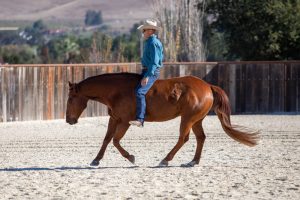 In 2015, the Schillers purchased a talented athletic chestnut gelding named Sherlock for Robyn to compete with in reining. The compact horse had a couple of issues Warwick was confident he could solve, using the familiar technique of beginning at the beginning and bringing the horse correctly past gaps or misunderstandings in his training. Those were not hard to solve, but Sherlock held a level of internal tension that affected his reining performances. And that was something Warwick could not solve.
In 2015, the Schillers purchased a talented athletic chestnut gelding named Sherlock for Robyn to compete with in reining. The compact horse had a couple of issues Warwick was confident he could solve, using the familiar technique of beginning at the beginning and bringing the horse correctly past gaps or misunderstandings in his training. Those were not hard to solve, but Sherlock held a level of internal tension that affected his reining performances. And that was something Warwick could not solve.
“I actually had to give up. Robyn kept competing with him, but I couldn’t fix him.”
That failure sent Warwick on a hunt to find something to help the horse—something that went beyond training.
In the remarkable way the right horse often shows up to lead a person in a new or deeper direction of self-understanding, Warwick came to realize Sherlock was an extremely shut-down horse—and that he himself was an emotionally shut-down human being. Through a remarkable series of events Warwick has detailed in his Journey On podcast, the trainer began the next steps on his journey as a human and horse trainer—steps that would lead him to re-think what he knew about how to work with equines.
“It sort of hit me that maybe I was missing out on a lot of being alive. Stuff like joy and anger and grief, the big human emotions, weren’t really part of my emotional vocabulary.”
A lifelong reader and researcher, Warwick went looking for ways to help Sherlock—and himself. As he did the personal work to open and improve his understanding of himself, he began to broaden his understanding of equine herd relationships and communication, which deeply affected his way of interacting with horses. The challenge then became keeping his successful horse training business going while simultaneously having the courage to explore new directions of growth and training.
“It was crazy,” he says. “I would go to a clinic or expo and literally say, ‘I know you came to see the trainer you’ve seen on YouTube, but I’m not that guy anymore and we’re just going to have to figure it out together.’”
Jane Pike has known Warwick since they met at a horse Expo in 2013. Pike is an equestrian coach who, via her Confident Rider website and JoyRide program, offers equestrian mindset and nervous system support to help riders improve har- mony with their horses. When they met, Pike was already a fan, being one of the first subscribers on his nascent membership platform. She talks of her respect for Warwick making changes in his methods.
“I really commend him on that [change]. I thought it was a massive thing. I remember having conversations at the start where he was like, ‘I’m not sure how this is gonna go. I don’t know if this is good. I’m not even sure.’ Right at the beginning, he was still working it out. And he was working it out with an audience. That’s a brave move. To step into an expo or clinic setting where there’s pressure and expectation and to be able to put everything on the line and make that shift is just a credit to him,” she says.
Enter Cody, a Mustang with a bolting problem.
At one of those early clinics where Warwick was just begin- ning to re-think his training assumptions, a Mustang named Cody blocked Warwick with his head as he went to walk around the off side. Instead of correcting the horse’s head and continuing around, Warwick stepped back and waited for the horse to relax.
“That little thing,” recalls Warwick, still showing wonder at the memory. “That tiny little thing told the horse I had seen what he said. And from stepping back and acknowledging I saw him, and seeing what happened, the walls sort of fell down for me.”
After about 20 minutes of waiting for the horse to relax, Warwick and Cody’s owner were able to walk around the horse without him blocking them. After Warwick went to work with other clinic participants, the horse lay down in the arena and went to sleep. The next day he slept throughout most of the clinic, with loudspeakers blaring and other horses and people walking around him.
“I think he felt safe for the first time,” says Warwick. “And his owner told me he has never bolted since.”
Relationship before Horsemanship
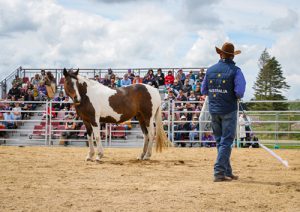 In 2023, after several years of settling in with his new understanding of how to relate with equines, Warwick published a book: The Principles of Training: Understanding the Relationship between You and Your Horse, and Why Effective Training Works.
In 2023, after several years of settling in with his new understanding of how to relate with equines, Warwick published a book: The Principles of Training: Understanding the Relationship between You and Your Horse, and Why Effective Training Works.
Unlike other horse-training books, The Principles of Training is not a step-by-step manual of techniques. Rather, it’s a series of principles that help a person recognize common training situa- tions and choose the best technique to respond with in order to help the horse along the training spectrum.
The final principle in the book is called “Relationship before Horsemanship.” This is where Warwick states his personal belief as how best to relate with and train equines. In the introduction, Warwick writes:
“Horsemanship in this case refers to the techniques that good horsemen and trainers use to create willing partners of horses. When you work with horses on a deeper level, almost a spiritual or soul level, you find that techniques alone leave you feeling like a master manipulator. I have found that creating connection first, true connec- tion through attunement, by communicating your awareness of the smallest things, take you and your horse on a journey that will change you as a person, to the benefit of not only your horse, but all sentient beings you encounter.”
Sentient: capable of sensing or feeling; finely sensitive in perception or feeling
Horses and humans are exquisitely sensitive beings whose nervous systems regulate their responses to the world. Recognizing states of arousal and ease, and understanding how both species toggle back and forth between them, is one key to the strength of Warwick Schiller’s work as a trainer—not only equines but of the humans who love them.
“All good horse training has to do with relationship,” he says. “What I’ve found is, if you can work on the relationship first and get a horse with a completely regulated nervous system around humans, if you can get that nervous system regulated through connection in the first place, then everything is easier.”
Robyn and Warwick are now offering their Journey On Ranch as a place to help humans learn to regulate nervous systems, and improve understanding and connection with themselves and, by extension, with horses. On-site clinics, retreats, and the Journey On Summit gath- erings now take place at the ranch in Paso Robles.
Doing the often-difficult work of increasing self-awareness and learning to become fully present is, Warwick says, crucial to trans- forming how humans view horses. He firmly believes in the ability of any one person to improve themselves, to open up to the mystery and magic of what equines offer in terms of relatedness and presence—and ultimately reap the benefits of the work in myriad ways.
“We have a little catchphrase we use: ‘You are the best person to train your horse,’” he says.
Most horse people understand that a horse is just a horse—and it is much more. The intertwinement of Equus caballus and Homo sapi- ens did not end with the advent of machines, the internet, and space travel. Rather, the relationship is perhaps more important than ever to keep us grounded and cognizant of our place on a fragile and pre- cious planet. As humans use our big brains and hearts to understand and help the species that brought us out of the Stone Age, Warwick Schiller’s dot-connecting journey shows a way to change the historic paradigm between horse and human.
Jane Pike puts it succinctly: “He is a paradigm shifter because of what he’s brought to the horse world and the amount of people he’s influencing through the information he’s sharing. And that can only ever be a good thing.”
Three Questions
What is a horse?
I think a horse is a lot… but on the pointy end of the stick, I think they’re here to save humanity.
I think they’re all the things along the way. They will be whatever you need them to be.
I think horses are the great conduit for change.
Who are you?
So, I’ve always been kind of a sharer. And, you know, everything I do that I share these days— when it’s on the podcast and videos, or whenever—it’s not from a place of authority. I’m saying: “This is the way I currently view the world. This is what I’ve seen, this is what I’ve noticed, and this is what I think, at the moment.”
I’m a bit of a dot-joiner. I don’t take credit for a lot of the stuff that I’m telling you. I’m just passing it along.
What are some things you hope people take away from reading an interview with you?
The thing I hope people get when they view any of the work I do is that you create your own reality. I’m a huge fan of the Wayne Dyer quote, “When you change the way you look at things, the things you look at change.”
The thing I’ve found since I started working with horses from a relational aspect is that they are a reflection of you and what you create. All horses would really love to get along with us and do whatever it is we want to do. If you can take the time to be the person they need, you’ll have a good relationship. My goal is for you is to know that it’s the relationship that gives the horses a feeling of safety.

